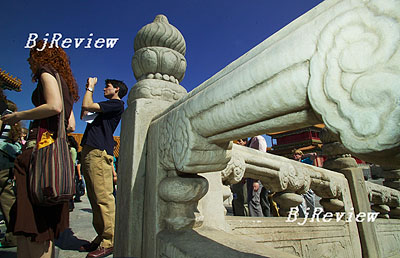
With the assistance of a taxi driver and after several hours on a train with his family, Kang Liqin finally found a hotel with vacant rooms.
While clean and comfortable, this two-star hotel saw a 40-percent rise of its price during the May Day "golden week." The taxi driver highly recommended the hotel, saying Kang was "very lucky" to find accommodation in Hangzhou. The city, known for its scenic attractions, was packed during the holiday.
"Many tourists are sleeping on the street," said the taxi driver.
Kang took the advice of the driver. She and her family had been to five hotels--all booked--before finding this one. Less than an hour after they settled in, the hotel was also out of rooms.
Over the next two days, as her family toured the city, Kang was able to see the so-called "golden tourism week" first hand. Tourists were everywhere. Once the family had to wait an hour for an open taxi. Lines were long in front of scenic spots that were packed with holiday photographers. Sometimes it didn't take much effort to walk--the push of the crowd moved the family along in a human river.
"We came to enjoy the scenery, but most of the time we just saw the back of the heads of other tourists," complained Kang.
And according to the Hangzhou Statistics Bureau, there were a lot of heads to see. Around 7.6 million tourists came to the city during the recent May Day holiday--nearly equal the number of its permanent residents. The Hangzhou Tourism Administration reported that hotels, restaurants, transportation services and scenic areas all operated beyond their capacity.
Hangzhou wasn't the only place to witness extraordinary holiday migration. Beijing, for instance, saw an influx of 4 million tourists, and about 1.8 million Beijingers left the capital city for the holiday.
According to the National Tourism Administration (NTA), during the holiday, 179 million Chinese traveled across the country--an increase of 36 million from the previous year--filling major scenic spots and transportation routes to full capacity.
Domestic tourism boom
In less than two decades, China has developed the world's largest domestic tourism market, said NTA Deputy Director Wang Zhifa.
"Tourism in China has experienced three stages of development," said Wang. "It began from mainly hosting foreign guests and becoming a source of China's foreign currency reserves to develop into the present domestic market dominated by Chinese tourists."
In 2006, the tourism sector registered 620 billion yuan in revenue from 1.39 billion individual Chinese tourists, a year-on-year growth of 17 and 15 percent respectively. For the first time, the growth of domestic tourism revenue exceeded that of GDP.
"Tourism has become the third most important family consumption, next to housing and automobiles," said Wang Maolin, Deputy Director of the China Society of Urban Economy. "It enjoys a huge market potential."
A study released by the World Travel and Tourism Council (WTTC) on China's tourism and travel economy predicts that income from tourism will account for 2.5 percent of the country's GDP in 2007. The study also optimistically forecasted that the tourism sector would see average sustained annual growth of 10.4 percent over the next decade.
Related industries have risen around the burgeoning domestic tourism industry. NTA statistics indicated that at the end of 2006, there were 12,000 star-level hotels, 16,000 travel agencies and over 20,000 tourist resorts. More than 48 million people are directly or indirectly employed in the tourism sector, accounting for 5.2 percent of the workforce in China. During the recent May Day holiday, some airlines operated flights exclusively to popular tourist destinations.
According to the 11th Five-Year Plan, by 2010 the number of domestic tourists will reach 1.78 billion, with tourism revenue surpassing 1.22 trillion yuan and accounting for 7 percent of the GDP. In 2015, the number of domestic tourists expects to exceed 2.6 billion, with tourism revenue hitting 2 trillion yuan.
"This constitutes an enormous market," said Shao Qiwei, Director of the NTA. "It will become a significant industry."
Open tourism markets
The growing Chinese tourism industry is not only exciting domestic travel agencies. Foreign agencies are eager to get in the game as well.
Under WTO commitments regarding opening its tourism sector to outside competition, China has to allow foreign investment in travel agencies and lift restrictions on where those travel agencies could locate by November 2007.
"In fact, tourism is among the earliest industries to open extensively to foreign investment," said Wang Zhifa. In July 2003, the NTA fulfilled its WTO commitments four years ahead of the deadline and approved the establishment of the first wholly funded foreign travel agency, Jalpak International (China) Co. Ltd., in Beijing.
| 